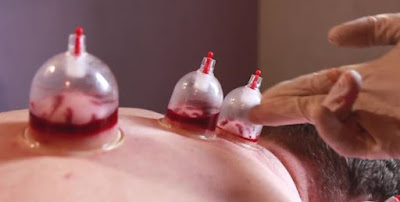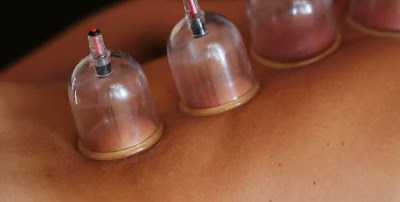Cupping therapy is a form of alternative medicine in which a local suction is created on the skin. Cupping has been characterized as pseudoscience and its practice as quackery. There is no evidence it has any health benefits and there are some risks of harm, especially from wet cupping and fire cupping.
Cupping Therapy
Cupping therapy is an ancient form of alternative medicine in which a therapist puts special cups on your skin for a few minutes to create suction. People get it for many purposes, including to help with pain, inflammation, blood flow, relaxation, and well-being, andv as a type of deep-tissue massage.
The cups may be made of: – Cupping Therapy
- Glass
- Bamboo
- Earthenware
- Silicone
Cupping Therapy might be trendy now, but it’s not new. It dates back to ancient Egyptian, Chinese, and Middle Eastern cultures. One of the oldest medical textbooks in the world, the Ebers Papyrus, describes how the ancient Egyptians used cupping therapy in 1,550 B.C.
“If there is something excellent to be used as a remedy, then it is Hijama Cupping”
Reported by Abu Huraira.[Sunan Ibn Maajah]
The Prophet (PBUH) explained that Hijama is one of the best medicines: “The best medicine with which you treat yourselves is Hijama, or it is one of the best of your medicines,” or “The best treatment you can use is Hijama.” [Sahih Bukhari Hadith-No: 5371]
“The best treatment is cupping, it removes blood, lightens the back, and sharpens the eyesight”. [Al–Hakim 4/212, At-Tirmidhi Hadith No: 3053]
 | |
|
Types – Cupping Therapy
There are different methods of cupping, including:
- Dry
- Wet
During both types of cupping, your therapist will put a flammable substance such as alcohol, herbs, or paper in a cup and set it on fire. As the fire goes out, he puts the cup upside down on your skin.
As the air inside the cup cools, it creates a vacuum. This causes your skin to rise and redden as your blood vessels expand. The cup is generally left in place for up to 3 minutes.
 | |
|
A more modern version of cupping uses a rubber pump instead of fire to create a vacuum inside the cup. Sometimes therapists use silicone cups, which they can move from place to place on your skin for a massage-like effect.
Wet cupping creates a mild suction by leaving a cup in place for about 3 minutes. The therapist then removes the cup and uses a small scalpel to make light, tiny cuts on your skin. Next, he or she does a second suction to draw out a small quantity of blood.
You might get 3-5 cups in your first session. Or you might just try one to see how it goes. It’s rare to get more than 5-7 cups, the British Cupping Society notes.
Afterward, you may get an antibiotic ointment and bandage to prevent infection. Your skin should look normal again within 10 days.
 | |
|
Cupping therapy supporters believe that wet cupping removes harmful substances and toxins from the body to promote healing. But that’s not proven.
Some people also get “needle cupping,” in which the therapist first inserts acupuncture needles and then puts cups over them.
There haven’t been many scientific studies on cupping.
One report, published in 2015 in the Journal of Traditional and Complementary Medicine, notes that it could help with acne, herpes zoster, and pain management.
 | |
|
That’s similar to the findings from a 2012 report, published in PLoS One. Australian and Chinese researchers reviewed 135 studies on cupping. They concluded that cupping therapy may be effective when people also get other treatments, like acupuncture or medications, for various diseases and conditions, such as:
Cupping Therapy
- Herpes zoster
- Acne
- Facial paralysis
- Cervical spondylosis
But those researchers noted many of the studies they reviewed could have been biased and that better studies are needed.
 | |
|
The British Cupping Society says that cupping therapy is used to treat: CONTINUE READING BELOW
- Blood disorders such as anemia and hemophilia
- Rheumatic diseases such as arthritis and fibromyalgia
- Fertility and gynecological disorders
- Skin problems such as eczema and acne
- High blood pressure
- Migraines
- Anxiety and depression
- Bronchial congestion caused by allergies and asthma
- Varicose veins
There isn’t research to back all of that up.
Cupping therapy isn’t recommended for everyone. Extra caution should be taken for the following groups:
- Children. Children under 4 years old shouldn’t receive cupping therapy. Older children should only be treated for very short periods.
- Seniors. Our skin becomes more fragile as we age. Any medication you may be taking might have an effect as well.
- Pregnant people. Avoid cupping the abdomen and lower back.
- Those who are currently menstruating.
.JPG) | |
|
Don’t use cupping if you use blood-thinning medication. Also, avoid cupping if you have:
- a sunburn
- a wound
- a skin ulcer
- experienced recent trauma
- an internal organ disorder
Preparing for your cupping appointment
Cupping is a long-practiced treatment that may help ease the symptoms of both temporary and chronic health conditions.
As with many alternative therapies, keep in mind that there haven’t been extensive studies performed without bias to fully assess their true effectiveness.
 | |
|
If you choose to try cupping, consider using it as a complement to your current doctor visits, not a substitute.
Cupping Therapy
Here are some things to consider before beginning cupping therapy:
- What conditions does the cupping practitioner specialize in treating?
- What method of cupping does the practitioner use?
- Is the facility clean? Does the practitioner implement safety measurements?
- Does the practitioner have any certifications?
- Do you have a condition that may benefit from cupping?
 |
| Mr. Muhammad Nurullah - Clinical Psychologist, Clinical Hypnotherapist, Hijama Course Director, Hypnotherapy Course Director |






cupping therapy, cupping therapy benefits, cupping therapy points, blog, cupping therapy at home,cupping therapy near me, cupping therapy price, wet cupping hijama,hijama therapy, cupping uses, cupping benefits
जवाब देंहटाएं